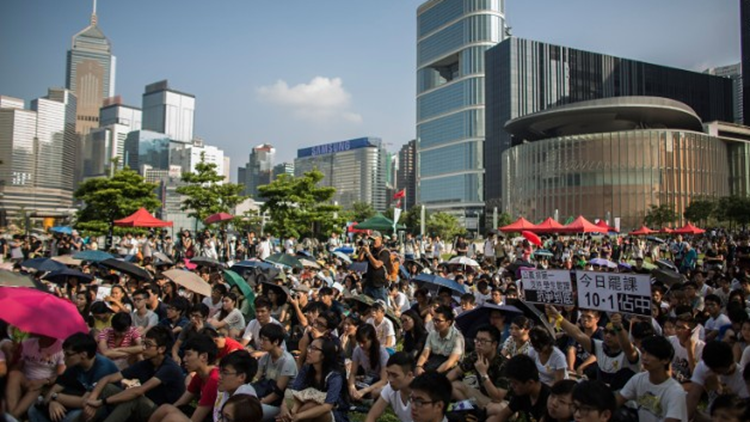HONG KONG (CNN) — Police in Hong Kong blocked more protesters from joining a pro-democracy rally outside the government headquarters as tensions rose Saturday, following more than 70 arrests of activists.
Organizers said some 50,000 protesters turned out for Saturday night’s rally.
Protesters already in the restricted zone announced they would stay overnight, but emergency personnel were the only people being allowed into the fenced-off area.
A CNN team could see them coming in and out of the area with protesters on stretchers.
The rally was due to start at 8 p.m. (8 a.m. ET) outside the government headquarters in the Admiralty area. But in the lead-up to it, police blocked off the main protest area in front of the headquarters and closed off footbridges to prevent any more people reaching it.
Activists put up umbrellas to protect themselves from possible pepper spray from police as they chanted “Let us in” in front of the government building.
Hong Kong police appealed to the protesters in the restricted area to leave as soon as possible, saying that having entered by “violent means” they were participating in an “unlawful assembly.”
“Otherwise, police will take actions and adopt effective measures to restore public order,” a police statement said. Those gathering nearby on Tim Mei Avenue were also urged to leave.
Hong Kong authorities said 34 people, nine of them women, had been treated in hospital for injuries suffered in the protest as of 6 p.m. Saturday. Of those, 29 have been discharged.
‘Forcible entry’
Earlier Saturday, the protesters said they would continue to occupy the area indefinitely until detained student activists are released and they are able to speak directly to Hong Kong’s leader, Chief Executive C.Y. Leung.
Thirteen student activists, including 17-year-old leader Joshua Wong, were arrested by Hong Kong police overnight, as Friday’s demonstrations took a heated turn. Authorities said those arrested ranged in age from 16 to 35.
Police said that after issuing warnings, they used pepper spray on a group of protesters who stormed the fenced area outside the government headquarters, at the climax of a day which saw high school students join a weeklong boycott of classes by university students.
Another 61 people, aged between 17 and 58, were arrested on Saturday afternoon “for forcible entry into government premises and unlawful assembly,” Hong Kong police said.
A 27-year-old man was also arrested for possession of an offensive weapon, police said.
A government statement urged teachers and parents not to let minors take part in the rally, saying their future opportunities could be affected.
Teachers were also warned that if they are convicted “as a result of participating in unlawful activities, they will have to bear their legal responsibilities as well as professional- and career-related consequences.”
Teenage leader
Yvonne Leung, spokesperson for Hong Kong Federation of Students, said that Wong, the student movement’s most prominent leader, was among those detained on Friday, and Max Lau, a spokesman for the student activist group Scholarism, told CNN that police searched his home.
Leung told CNN the students were unhappy that the city’s leader had not granted them an audience.
In a statement, the Hong Kong government expressed regret over the incident, which it said resulted in injuries to security personnel and others.
“While the public meeting participants kept claiming that it was a nonviolent and peaceful public meeting, they forced entry into the forecourt leading to injuries,” the statement said. “All along (the government) respected the public’s freedom of expression and freedom of assembly.”
The protest capped a campaign involving classroom strikes and sit-ins. It was the biggest flare-up in street protests since Beijing ruled out free elections for Hong Kong in August.
Protesters, riot police
Leaders of the Occupy Central movement, which is vowing to stage a mass protest in the city’s financial district over the suffrage issue, released a statement expressing support for the students.
Co-founder Benny Tai said he would stay with the students until the last minute and was prepared to be arrested.
Speaking ahead of Saturday evening’s rally, he cheered on the protesters who had stayed in the area overnight.
“We are willing to pay the price for civil disobedience,” he said.
“The students are calling for true universal suffrage. We will first Occupy Admiralty then Occupy Central and fight for true democracy!”
Student and citizen protesters, many of them wearing white with a yellow ribbon, stood and sat on the pavement and road adjacent to the government headquarters, with medical volunteers standing by.
Volunteers were also handing out food and drinks as well as plastic goggles, cling film and plastic ponchos to protect against pepper spray.
A number of police officers were stationed around the area, with a group of at least 30 officers dressed in riot gear with helmets and plastic shields positioned directly opposite the sit-in.
Skipping class for democracy
Since the handover from Britain to China 17 years ago, the people of Hong Kong have been granted a wide range of civil liberties and a measure of autonomy under the governing principle known as “one country, two systems.”
But many believe that way of life is under threat as Beijing affirms its political authority over Hong Kong.
The students want to pressure China into giving Hong Kong full universal suffrage: one man, one vote, plus the ability to choose its own candidates independent of Beijing.
In August, Beijing ruled that candidates for the city’s top post must be selected by a committee perceived to serve the Chinese Communist Party.
Although most are not old enough to drive in the former British colony, the students’ political vision is clear.
“The future of Hong Kong is ours,” said 16-year-old student protester Phoebe Leung.
“I can’t change Hong Kong, but if all of us are here … we may change Hong Kong’s future.”
CNN’s Esther Pang, Vivian Kam, and Katie Hunt contributed to this report.



